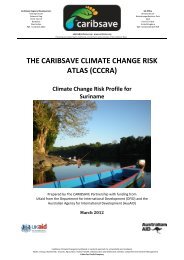You also want an ePaper? Increase the reach of your titles
YUMPU automatically turns print PDFs into web optimized ePapers that Google loves.
terrestrial habitats for the purposes of addressing the inconsistencies in existing habitat classifications <strong>and</strong><br />
more effective management.<br />
Although there is no formal integration of Government Departments, they routinely work together,<br />
particularly when addressing large-scale developments. Several policies under the DECR focus on the<br />
marine <strong>and</strong> coastal environment <strong>and</strong> promote an integrated approach to resource management.<br />
Scrubl<strong>and</strong>s comprise the majority of terrestrial vegetation <strong>and</strong> are considered as an extension of the coastal<br />
ecosystem thus management of the bushes is integrated into the coastal management framework.<br />
Protected areas are one of the management tools that TCI has been using as a conservation measure.<br />
There are now 34 Protected Areas with 19 protecting marine or coral reef resources yet less than 1% of<br />
coral reefs are protected within these MPAs. Despite these initiatives the DECR is still constrained by a<br />
limited staff <strong>and</strong> finances.<br />
Recommendations coming out of the Climate Change Green Paper include the maintenance <strong>and</strong><br />
restoration of mangroves, upl<strong>and</strong> wetl<strong>and</strong>s <strong>and</strong> forests, <strong>and</strong> education of fisher folk about best practices<br />
<strong>and</strong> the need to enhance resilience of coral reefs for ensuring their livelihood, transplanting coral reefs<br />
from resilient ecological zones. Additionally, strengthening protected area networks is one way of adopting<br />
an ecosystem-based approach to adaptation, i.e. one that integrates the use of biodiversity <strong>and</strong> ecosystem<br />
services into an overall strategy to help people adapt to the adverse impacts of climate change. This<br />
strategy should:<br />
establish a more effective fish sanctuary <strong>and</strong> MPA management <strong>and</strong> enforcement system for<br />
coastal communities;<br />
enhance the capacity of resource managers <strong>and</strong> users to be more resilient to climate change; <strong>and</strong><br />
establish a sustainable finance mechanism for supporting fish sanctuary <strong>and</strong> MPA management.<br />
The strategy should increase the involvement of the tourism sector (various hotels, the <strong>Turks</strong> <strong>and</strong> <strong>Caicos</strong><br />
Hotel <strong>and</strong> Tourism Association) in collaboration with the Department for the Environment <strong>and</strong> Coastal<br />
Resources in supporting community-based MPAs, as well as provide opportunities for alternative<br />
livelihoods <strong>and</strong> technologies for public education.<br />
It is also important to educate tourists who interact with TCI’s biodiversity <strong>and</strong> films can be effective tools<br />
in influencing human behaviour. Short videos encouraging visitors to be more conscious of their impacts on<br />
the fragile ecosystems of the isl<strong>and</strong>s can be shown during in-bound international flights. The films should<br />
focus on positive actions that visitors can take to minimise negative impacts on the environment by<br />
decreasing energy <strong>and</strong> water consumption <strong>and</strong> wastage, <strong>and</strong> by taking necessary precautions during<br />
marine based recreation (diving, snorkelling, boating). The films should be geared towards showing viewers<br />
how their vacation experience will be enhanced if they use environmentally friendly practices.<br />
Conclusion<br />
The <strong>Turks</strong> & <strong>Caicos</strong> Isl<strong>and</strong>s has a strong dependence on the tourism industry <strong>and</strong> the many natural assets<br />
that enable tourism to be successful. Terrestrial <strong>and</strong> marine ecosystems <strong>and</strong> water resources are already<br />
facing serious pressures from increasing development <strong>and</strong> poor l<strong>and</strong> use practices <strong>and</strong> climate change is<br />
exacerbating these impacts. It is evident that the Government of TCI is committed to adapting to climate<br />
change. Many policies <strong>and</strong> plans for action are in place, but serious financial resource shortages along with<br />
limited technical capacities hinder the successful adaptation efforts across most government ministries <strong>and</strong><br />
other stakeholder groups.<br />
xxxvi





